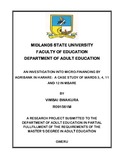Please use this identifier to cite or link to this item:
https://cris.library.msu.ac.zw//handle/11408/2490| Title: | An investigation into micro-financing by Agribank in Harare: a case study of wards 3, 4, 11 and 12 in Mbare | Authors: | Bwakura, Vimbai | Keywords: | Poverty Employment |
Issue Date: | 2015 | Publisher: | Midlands State University | Abstract: | This study sought to investigate the micro financing by Agribank in wards 3, 4, 11 and 12 of Mbare in Harare. Mbare is one of the oldest townships in Harare and has the poorest people in the city (Moyo, 2008). Therefore, Agribank earmarked to bring development in the area thereby reducing poverty, creating employment and promote gender equality. The study is principally qualitative and quantitative in nature as it sought to provide an in-depth analysis of micro financing by Agribank. The researcher used descriptive survey design. In addition, for the purpose of data collection, the study relied on the use of questionnaires and interviews to establish the impact of micro financing by Agribank. A group of 104 respondents that included 100 beneficiaries and 4 Agribank field officers were sampled using simple random sampling and purposive sampling. The demographic variables of the respondents that were analysed include gender, age and education level. The findings of the study revealed that more women participated in the study as compared to men. Mostly young men and women accessed microfinance for their small businesses. Moreover, the study found out that micro financing by Agribank was a vehicle for eradicating poverty as many households consumption increased. The micro financing programme created employment among the youths and adults as they engage into informal businesses. Furthermore, findings show that Agribank micro financing achieved gender equality through women empowerment. However, they were dissenting voices among the respondents that Agribank was utilised by the ZANU PF (Zimbabwe African National Union Patriotic Front)politicians as campaigning strategy in order to gain political mileage. It was therefore recommended that Agribank seek credit lines or be in partnership with well-funded institutions in order to improve the liquidity challenges. The Government of Zimbabwe must subsidise microfinance loans through the bank to achieve low interest rates for the poor people. To reduce the intrusion by ZANU PF politicians in the operations of the bank it was recommended that the bank be privatised. The research study is significant to Agribank management in determining areas for improvement so as to ensure their success and enhance service delivery so that the low income earners and those who do not have bank accounts have the same opportunities of accessing financial services. | URI: | http://hdl.handle.net/11408/2490 |
| Appears in Collections: | Master’s Degree In Adult Education |
Files in This Item:
| File | Description | Size | Format | |
|---|---|---|---|---|
| BWAKURA.pdf | Full Text | 539.03 kB | Adobe PDF |  View/Open |
Page view(s)
230
checked on Feb 25, 2026
Download(s)
112
checked on Feb 25, 2026
Google ScholarTM
Check
Items in MSUIR are protected by copyright, with all rights reserved, unless otherwise indicated.



